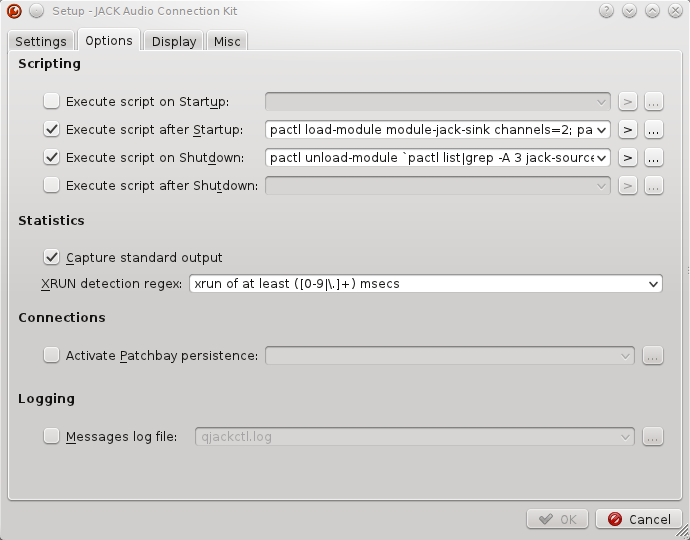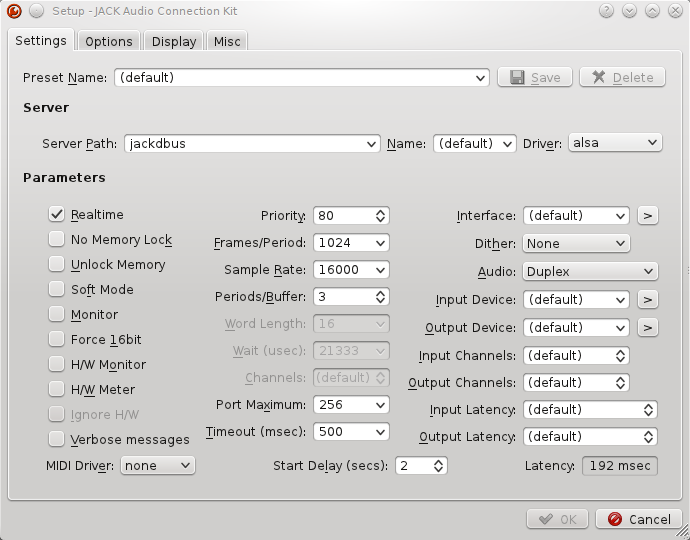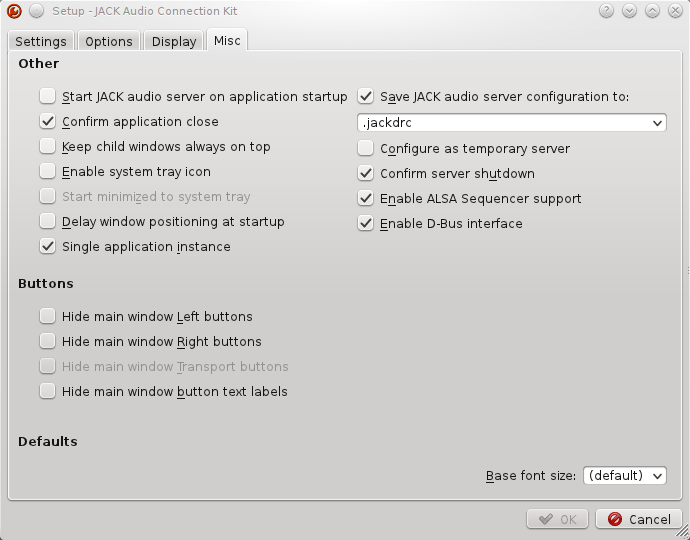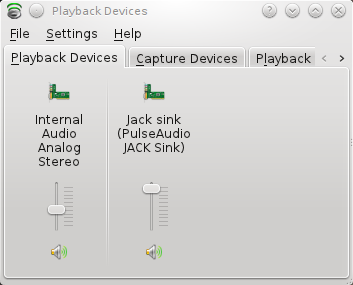JACK: Difference between revisions
imported>Facundominguez Comment on the need for JACK_PROMISCUOUS_SERVER |
imported>Voyd Add tips for running nix-provided jack clients on arch linux |
||
| (7 intermediate revisions by 5 users not shown) | |||
| Line 1: | Line 1: | ||
One may use [https://github.com/NixOS/nixpkgs/blob/nixos-unstable/nixos/modules/services/audio/jack.nix JACK module]. It works both with and without PulseAudio. Enable it this way '''and reboot''': | |||
{{file|/etc/nixos/configuration.nix|nix|<nowiki> | {{file|/etc/nixos/configuration.nix|nix|<nowiki> | ||
services.jack = { | services.jack = { | ||
| Line 9: | Line 9: | ||
enable = true; | enable = true; | ||
# buffering parameters for dmix device to work with ALSA only semi-professional sound programs | # buffering parameters for dmix device to work with ALSA only semi-professional sound programs | ||
dmixConfig = '' | #dmixConfig = '' | ||
# period_size 2048 | |||
''; | #''; | ||
}; | }; | ||
}; | }; | ||
users.extraUsers.YOURUSER.extraGroups = [ "jackaudio" ]; | users.extraUsers.YOURUSER.extraGroups = [ "jackaudio" ]; | ||
</nowiki>}} | </nowiki>}} | ||
Since the config above and below apparently does not work for several users, according to forum posts, here a solution that works: | |||
- Add musnix channel (https://github.com/musnix/musnix) | |||
{{file|/etc/nixos/configuration.nix|nix|<nowiki> | |||
imports = [ <musnix> ]; | |||
environment.systemPackages = with pkgs; [ libjack2 jack2 qjackctl ]; | |||
environment.systemPackages = with pkgs; [ pavucontrol libjack2 jack2 qjackctl jack2Full jack_capture ]; | |||
security.sudo.extraConfig = '' | |||
moritz ALL=(ALL) NOPASSWD: ${pkgs.systemd}/bin/systemctl | |||
''; | |||
musnix = { | |||
enable = true; | |||
alsaSeq.enable = false; | |||
# Find this value with `lspci | grep -i audio` (per the musnix readme). | |||
# PITFALL: This is the id of the built-in soundcard. | |||
# When I start using the external one, change it. | |||
soundcardPciId = "00:1f.3"; | |||
# magic to me | |||
rtirq = { | |||
# highList = "snd_hrtimer"; | |||
resetAll = 1; | |||
prioLow = 0; | |||
enable = true; | |||
nameList = "rtc0 snd"; | |||
}; | |||
}; | |||
</nowiki>}} | |||
After a reboot, you can enable JACKD using "pasuspender qjackctl" and start jackd by pressing the start button. | |||
You can test, if your JACK works, using the command jack_simple_client, which produces a sound if JACK is running. | |||
Sources: | |||
https://discourse.nixos.org/t/declarative-audio-config-how-to-start-and-maybe-use-jack/5458 | |||
https://github.com/NixOS/nixpkgs/issues/71283 | |||
{{Outdated|needs cleanup}} | {{Outdated|needs cleanup}} | ||
| Line 138: | Line 176: | ||
}; | }; | ||
</syntaxHighlight> | </syntaxHighlight> | ||
[[ | |||
== Connecting nix JACK clients to Pipewire installed via other package managers == | |||
Pipewire offers a JACK API, but applications installed via nix are not able to connect to it out of the box. | |||
Use the following command to make them work (using qsynth as an example): | |||
<syntaxHighlight lang="bash"> | |||
LD_LIBRARY_PATH="$(nix build nixpkgs#pipewire.jack --print-out-paths)/lib" nix run nixpkgs#qsynth | |||
</syntaxHighlight> | |||
You can also wrap it in a script, for adding this to your home-manager config will allow using `nix-jack nix run nixpkgs#qsynth` | |||
<syntaxHighlight lang="nix"> | |||
home.packages = with pkgs; [ | |||
(writeShellScriptBin "nix-jack" '' | |||
exec /usr/bin/env \ | |||
LD_LIBRARY_PATH=${pipewire.jack}/lib''${LD_LIBRARY_PATH:+:''${LD_LIBRARY_PATH}} \ | |||
"''$@" | |||
'') | |||
] | |||
</syntaxHighlight> | |||
or | |||
<syntaxHighlight lang="nix"> | |||
let | |||
jackWrap = drv: pkgs.symlinkJoin { | |||
name = "${drv.name}-jackwrapped"; | |||
paths = [ drv ]; | |||
buildInputs = [ pkgs.makeWrapper ]; | |||
postBuild = '' | |||
ls "$out/bin" | |||
for b in "$out/bin/"*; do | |||
wrapProgram "$b" \ | |||
--prefix LD_LIBRARY_PATH : "${pkgs.pipewire.jack}/lib" | |||
done | |||
''; | |||
}; | |||
in [ | |||
(jackWrap pkgs.qsynth) | |||
] | |||
</syntaxHighlight> | |||
This is necessary because of the way the pipewire jack interface works. By using a pipewire-provided dynamically linked library, the connection attempt is translated to a pipewire connection inside the client process. Other distributions such as Arch Linux implement this by just placing the .so files in /usr/lib but since nix application don't include that directory we need this approach. | |||
(Tested on Arch Linux in May 2023) | |||
If you know of a way to do this without wrapping each individual package, please add it here. | |||
[[Category:Audio]] | |||
[[Category:Applications]] | |||
Latest revision as of 23:35, 1 May 2023
One may use JACK module. It works both with and without PulseAudio. Enable it this way and reboot:
services.jack = {
jackd.enable = true;
# support ALSA only programs via ALSA JACK PCM plugin
alsa.enable = false;
# support ALSA only programs via loopback device (supports programs like Steam)
loopback = {
enable = true;
# buffering parameters for dmix device to work with ALSA only semi-professional sound programs
#dmixConfig = ''
# period_size 2048
#'';
};
};
users.extraUsers.YOURUSER.extraGroups = [ "jackaudio" ];
Since the config above and below apparently does not work for several users, according to forum posts, here a solution that works:
- Add musnix channel (https://github.com/musnix/musnix)
imports = [ <musnix> ];
environment.systemPackages = with pkgs; [ libjack2 jack2 qjackctl ];
environment.systemPackages = with pkgs; [ pavucontrol libjack2 jack2 qjackctl jack2Full jack_capture ];
security.sudo.extraConfig = ''
moritz ALL=(ALL) NOPASSWD: ${pkgs.systemd}/bin/systemctl
'';
musnix = {
enable = true;
alsaSeq.enable = false;
# Find this value with `lspci | grep -i audio` (per the musnix readme).
# PITFALL: This is the id of the built-in soundcard.
# When I start using the external one, change it.
soundcardPciId = "00:1f.3";
# magic to me
rtirq = {
# highList = "snd_hrtimer";
resetAll = 1;
prioLow = 0;
enable = true;
nameList = "rtc0 snd";
};
};
After a reboot, you can enable JACKD using "pasuspender qjackctl" and start jackd by pressing the start button.
You can test, if your JACK works, using the command jack_simple_client, which produces a sound if JACK is running.
Sources: https://discourse.nixos.org/t/declarative-audio-config-how-to-start-and-maybe-use-jack/5458 https://github.com/NixOS/nixpkgs/issues/71283
The Jack Audio Connection Kit is used by most of the serious audio applications on Linux. It provides real-time, low latency connections for both audio and MIDI data between applications that implement its API. NixOS uses the dbus version of JACK2 (jackdbus). This can be used together with pulseaudio with a little configuration. The result is that you don't have to manually hunt down applications which are using the sound device and kill them before starting JACK. You can also continue to use non-JACK aware applications (e.g. flash) at the same time as using JACK applications (e.g. Ardour).
- Load the sequencer and midi kernel modules
- boot.kernelModules = [ "snd-seq" "snd-rawmidi" ];
- Enable JACK support
- In your configuration file:
hardware.pulseaudio.package = pkgs.pulseaudio.override { jackaudioSupport = true; };
- Ensure that the JACK enabled pulseaudio is being used
- ~/.config/pulse/client.conf
daemon-binary=/var/run/current-system/sw/bin/pulseaudio
- Configure QjackCtl
- Enable jackdbus
- Load the jack modules for pulseaudio after starting jackdbus
- Setup -> Settings -> Options -> Execute script after Startup: check
pactl load-module module-jack-sink channels=2; pactl load-module module-jack-source channels=2; pacmd set-default-sink jack_out
- Setup -> Settings -> Options -> Execute script on Shutdown: check
pactl unload-module `pactl list|grep -A 3 jack-source|tail -1|awk '{ print $NF }'`;pactl unload-module `pactl list|grep -A 3 jack-sink|tail -1|awk '{ print $NF }'`
You should now be able to start JACK with QjackCtl, you will notice a new playback and capture device in your sound mixer along with your normal devices.
Troubleshooting JACK and PulseAudio
$ pactl load-module module-jack-sink channels=2 Failure: Module initalization failed
Check if you have previous settings in ~/.config/jack/conf.xml. Try renaming this file and running the pactl command again.
You might need this setting so JACK_PROMISCUOUS_SERVER is defined when pulseaudio is started.
systemd.user.services.pulseaudio.environment = {
JACK_PROMISCUOUS_SERVER = "jackaudio";
};
Otherwise, you may get further info by disabling PulseAudio respawning (see above) and starting it in verbose mode:
$ pulseaudio -vvv
System optimizations for low latency audio with JACK
Some of the following settings, documented in http://wiki.linuxmusicians.com/doku.php?id=system_configuration and https://wiki.archlinux.org/index.php/Pro_Audio can be very helpful to reduce xruns and improve responsiveness and are required for certain programs to run at all e.g. Ardour. The kernelPackages section was taken from https://github.com/rockfabrik/deployment/blob/master/modules/profiles/dj.nix#L32
An easy way of setting all of these, plus a true realtime kernel, is here: https://github.com/musnix/musnix
boot = {
kernelModules = [ "snd-seq" "snd-rawmidi" ];
kernel.sysctl = { "vm.swappiness" = 10; "fs.inotify.max_user_watches" = 524288; };
kernelParams = [ "threadirq" ];
kernelPackages = let
rtKernel = pkgs.linuxPackagesFor (pkgs.linux.override {
extraConfig = ''
PREEMPT_RT_FULL? y
PREEMPT y
IOSCHED_DEADLINE y
DEFAULT_DEADLINE y
DEFAULT_IOSCHED "deadline"
HPET_TIMER y
CPU_FREQ n
TREE_RCU_TRACE n
'';
}) pkgs.linuxPackages;
in rtKernel;
postBootCommands = ''
echo 2048 > /sys/class/rtc/rtc0/max_user_freq
echo 2048 > /proc/sys/dev/hpet/max-user-freq
setpci -v -d *:* latency_timer=b0
setpci -v -s $00:1b.0 latency_timer=ff
'';
# The SOUND_CARD_PCI_ID can be obtained like so:
# $ lspci ¦ grep -i audio
};
powerManagement.cpuFreqGovernor = "performance";
fileSystems."/" = { options = "noatime errors=remount-ro"; };
security.pam.loginLimits = [
{ domain = "@audio"; item = "memlock"; type = "-"; value = "unlimited"; }
{ domain = "@audio"; item = "rtprio"; type = "-"; value = "99"; }
{ domain = "@audio"; item = "nofile"; type = "soft"; value = "99999"; }
{ domain = "@audio"; item = "nofile"; type = "hard"; value = "99999"; }
];
services = {
udev = {
packages = [ pkgs.ffado ]; # If you have a FireWire audio interface
extraRules = ''
KERNEL=="rtc0", GROUP="audio"
KERNEL=="hpet", GROUP="audio"
'';
};
cron.enable =false;
};
shellInit = ''
export VST_PATH=/nix/var/nix/profiles/default/lib/vst:/var/run/current-system/sw/lib/vst:~/.vst
export LXVST_PATH=/nix/var/nix/profiles/default/lib/lxvst:/var/run/current-system/sw/lib/lxvst:~/.lxvst
export LADSPA_PATH=/nix/var/nix/profiles/default/lib/ladspa:/var/run/current-system/sw/lib/ladspa:~/.ladspa
export LV2_PATH=/nix/var/nix/profiles/default/lib/lv2:/var/run/current-system/sw/lib/lv2:~/.lv2
export DSSI_PATH=/nix/var/nix/profiles/default/lib/dssi:/var/run/current-system/sw/lib/dssi:~/.dssi
'';
users = {
extraUsers.yourname= {
extraGroups = [ "wheel" "audio" ];
};
};
Connecting nix JACK clients to Pipewire installed via other package managers
Pipewire offers a JACK API, but applications installed via nix are not able to connect to it out of the box.
Use the following command to make them work (using qsynth as an example):
LD_LIBRARY_PATH="$(nix build nixpkgs#pipewire.jack --print-out-paths)/lib" nix run nixpkgs#qsynth
You can also wrap it in a script, for adding this to your home-manager config will allow using `nix-jack nix run nixpkgs#qsynth`
home.packages = with pkgs; [
(writeShellScriptBin "nix-jack" ''
exec /usr/bin/env \
LD_LIBRARY_PATH=${pipewire.jack}/lib''${LD_LIBRARY_PATH:+:''${LD_LIBRARY_PATH}} \
"''$@"
'')
]
or
let
jackWrap = drv: pkgs.symlinkJoin {
name = "${drv.name}-jackwrapped";
paths = [ drv ];
buildInputs = [ pkgs.makeWrapper ];
postBuild = ''
ls "$out/bin"
for b in "$out/bin/"*; do
wrapProgram "$b" \
--prefix LD_LIBRARY_PATH : "${pkgs.pipewire.jack}/lib"
done
'';
};
in [
(jackWrap pkgs.qsynth)
]
This is necessary because of the way the pipewire jack interface works. By using a pipewire-provided dynamically linked library, the connection attempt is translated to a pipewire connection inside the client process. Other distributions such as Arch Linux implement this by just placing the .so files in /usr/lib but since nix application don't include that directory we need this approach.
(Tested on Arch Linux in May 2023)
If you know of a way to do this without wrapping each individual package, please add it here.



